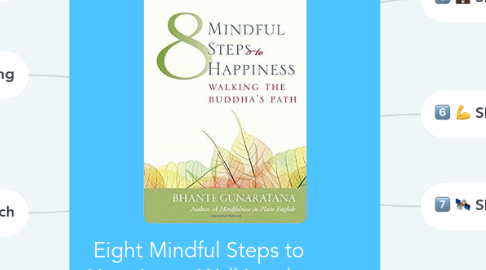
1. Skillful understanding
1.1. Four Noble Truths
1.1.1. Dissatisfaction
1.1.1.1. Birth
1.1.1.2. Old age
1.1.1.3. Sickness
1.1.1.4. Separation (from what we love)
1.1.1.5. Association (with what we hate)
1.1.1.6. Not getting what we want
1.1.1.7. Getting what we don't want
1.1.2. The origin of dissatisfaction
1.1.2.1. Desire
1.1.2.1.1. Impermanence
1.1.2.1.2. Unsatisfactoriness
1.1.2.1.3. Selflessness
1.1.3. The cessation of dissatisfaction
1.1.3.1. It exists! It's true!
2. Skillful thinking
2.1. Letting go
2.1.1. Areas
2.1.1.1. Possessions
2.1.1.2. People
2.1.1.3. Ideas, believes & opinions
2.1.1.4. Mind & body
2.1.2. Obstacles
2.1.2.1. Fear
2.1.3. Tools
2.2. Loving friendliness
2.2.1. Areas
2.2.1.1. Family
2.2.1.2. Friends
2.2.1.3. Strangers
2.2.1.4. Enemies
2.2.2. Obstacles
2.2.2.1. Anger
2.2.3. Tools
2.2.3.1. Patience
2.2.3.2. Mindfulness
2.3. Compassion
2.3.1. Areas
2.3.1.1. Ourselves
2.3.1.2. Others
2.3.1.2.1. Children
2.3.1.2.2. Partner
2.3.2. Obstacles
2.3.2.1. Lack of self-compassion
2.3.2.2. Narcissism
2.3.3. Tools
2.3.3.1. Personal experience of suffering
2.3.3.2. Loving friendliness
2.3.3.3. Mindfulness
3. Skillful speech
3.1. Always truthful
3.1.1. True
3.1.2. Correct
3.1.3. Beneficial
3.1.4. Timely
3.2. Uplifting, not malicious or unkind.
3.2.1. Does not destroy friendships
3.2.2. Does not damage reputations
3.3. Gentle, not crude or harsh
3.3.1. Dont
3.3.1.1. Abuse
3.3.1.2. Profanity
3.3.1.3. Sarcasm
3.3.1.4. Hypocrisy
3.3.1.5. Blunt & belittling critism
3.3.1.6. Lie
3.3.2. Do
3.3.2.1. Awaken
3.3.2.2. Console
3.3.2.3. Encourage
3.4. Moderate, not useless or meaningless
3.4.1. Gossip
3.4.2. Chitchat / Idle talk
4. Skillful action
4.1. The five precepts
4.1.1. Abstain from
4.1.1.1. Killing
4.1.1.1.1. Including
4.1.1.1.2. Obstacles
4.1.1.2. Stealing
4.1.1.2.1. Including
4.1.1.2.2. Obstacles
4.1.1.3. Speaking falsely
4.1.1.4. Sexual misconduct
4.1.1.4.1. Including
4.1.1.4.2. Obstacles
4.1.1.5. Misusing alcohol or other intoxicants
4.1.1.5.1. Including
4.1.1.5.2. Obstacles
5. Skillful livelihood
5.1. Does it cause harm to others or myself?
5.1.1. Weapons
5.1.2. Intoxicans
5.1.3. Poison
5.1.3.1. Includes
5.1.3.1.1. Hate journalism
5.1.3.1.2. Hate politics
5.1.3.1.3. Drugs
5.1.4. Killing
5.1.5. Fighting
5.1.6. Gambling
5.1.7. Crime
5.2. Does it cause me to break the five moral precepts of skillful action?
5.3. Does it give me unwholesome thoughts and feelings?
5.3.1. Does it make it hard for me to concentrate?
5.3.2. Does it cause restlessness?
6. Skillful effort
6.1. 10 fetters
6.1.1. 1st stage
6.1.1.1. Belief in the existence of a permanent self or soul
6.1.1.2. Doubt in the message of Buddha
6.1.1.3. Belief that one can end suffering merely by following rules and rituals
6.1.2. 2nd & 3rd stage
6.1.2.1. Greed for sensual pleasures (gross greed)
6.1.2.2. Hatred
6.1.3. 4th stage
6.1.3.1. Subtle desire to exist in immaterial form
6.1.3.2. Subtle desire to exist in fine material form
6.1.3.3. Conceit, or the underlying perception of self-identity
6.1.3.4. Restlessness & worry
6.1.3.5. Ignorance
6.2. 5 hindrances
6.2.1. Greed
6.2.1.1. Food
6.2.1.2. Things
6.2.1.3. Lust
6.2.2. Ill will
6.2.2.1. Hatred
6.2.2.2. Anger
6.2.2.3. Resentment
6.2.3. Dullness & drowsiness
6.2.4. Restlessness & worry
6.2.5. Doubt
6.3. Tools
6.3.1. Prevent negative states of mind
6.3.1.1. 5 points to mindfulness
6.3.1.1.1. Morality
6.3.1.1.2. Mindfulness
6.3.1.1.3. Wisdom
6.3.1.1.4. Paitience
6.3.1.1.5. Effort
6.3.2. Overcome negative states of mind
6.3.3. Cultivate positive states of mind
6.3.4. Maintain positive states of mind
7. Skillful mindfulness
7.1. The four foundations of mindfulness
7.1.1. Mindfulness of the body
7.1.1.1. Mindfulness of the breath
7.1.1.2. Mindfulness of posture
7.1.1.3. Mindfulness of the parts of the body
7.1.2. Mindfulness of feelings
7.1.2.1. Wordly
7.1.2.1.1. Examples
7.1.2.1.2. Result
7.1.2.2. Unwordly
7.1.2.2.1. Examples
7.1.3. Mindfulness of the mind
7.1.3.1. Greedy
7.1.3.2. Non-greedy
7.1.4. Mindfulness of mental objects
7.1.4.1. Examples = Thoughts
7.1.4.1.1. Fetters
7.1.4.1.2. Hindrances
7.1.4.1.3. The five aggregates of existence
7.1.4.1.4. Factors of enlightenment
7.1.4.1.5. The four noble truths
8. Skillful concentration
8.1. Characteristics
8.1.1. Always
8.1.1.1. Wholesome
8.1.1.2. One-pointedness
8.1.1.3. Mindfulness
8.1.2. Never
8.1.2.1. Greed
8.1.2.2. Hate
8.1.2.3. Delusion
8.2. One-pointed concentration
8.2.1. Components
8.2.1.1. (a) Initial application of thought
8.2.1.2. (b) Sustained application of thought
8.2.1.3. (c) Joy
8.2.1.4. (d) Happiness
8.2.1.5. (e) Concentration
8.2.2. Levels
8.2.2.1. 1
8.2.2.1.1. All components
8.2.2.2. 2
8.2.2.2.1. Remove (a) and (b)
8.2.2.3. 3
8.2.2.3.1. Remove (a), (b) and (c)
8.2.2.4. 4
8.2.2.4.1. Remove (a), (b), (d) and (d)
8.3. How-to
8.3.1. Focus on breath (or similar), ignore thoughts, feelings (and similar)
